Hello there!
From the moment they are born, babies are interested in the people around them. Within a few days of birth, babies look closely at the faces they see, and they will even copy simple actions that other people do, like sticking out a tongue! Very soon after arriving in the world, by 5 or 6 weeks, babies become quite alert to people and will try to ‘answer’ with coos when people talk to them.
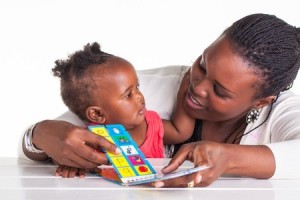 By the time they’re around 3 months they will be really interested in watching what adults do. Babies will now start smile back when you smile at them. They’ll begin to have pretend conversations with adults, where they try to talk back and forth – it might be just gurgles and coos, but your baby is learning how to engage with you.
By the time they’re around 3 months they will be really interested in watching what adults do. Babies will now start smile back when you smile at them. They’ll begin to have pretend conversations with adults, where they try to talk back and forth – it might be just gurgles and coos, but your baby is learning how to engage with you.
Babies are already working hard to form relationships with their parents, to communicate with them and to find out all about the world from them. Make being dressed and bathed more fun for you and your baby by chatting, singing or playing games. Knowing what your baby likes and doesn’t like will make parenting easier for you.
Towards the end of the first year of life, babies enjoy playing back and forth games like peek-a-boo. They’ll also start to want to play with toys with you, not just on their own. This all shows how social your baby is, and how much they love being with you!
Here is a short video about babies’ emotional wellbeing:
Thanks to the Getting to Know Your Baby project for letting us include this video. Copyright owned by NSPCC and Warwick Medical School: www.your-baby.org.uk
Who am I?
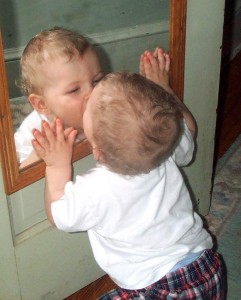 What’s really amazing is that young babies don’t yet understand that they are separate from other people and the rest of the world! Babies under 4 months don’t realise that they are one person, with a separate body and mind, and you are another person, with a different body and mind. It’s all mixed up for them!
What’s really amazing is that young babies don’t yet understand that they are separate from other people and the rest of the world! Babies under 4 months don’t realise that they are one person, with a separate body and mind, and you are another person, with a different body and mind. It’s all mixed up for them!
So babies aren’t able to think ‘you’re no good’ or ‘I don’t like you’, because they don’t distinguish themselves from you. So if they cry or seem unhappy, it’s more like they’re saying ‘Hey this isn’t nice, is it? Poor us!’
Babies won’t recognise themselves in photos or a mirror until they’re almost 2 years old. Before this age, babies think their reflection in the mirror is another child. If you hold your baby up to mirror, he or she will touch their reflection and may even seem to be trying to get through the mirror!
You can work out if babies recognise themselves in a mirror by putting a red spot on their nose – if they touch their own nose when they look in the mirror, they must realise that the baby in the mirror is actually them.
Face to face
 From right after they are born, babies show an interest in looking at people’s faces. Not only that, but from one day old they prefer their own mother’s face to any other woman’s, even though they might have just spent a few hours with her.
From right after they are born, babies show an interest in looking at people’s faces. Not only that, but from one day old they prefer their own mother’s face to any other woman’s, even though they might have just spent a few hours with her.
Babies also show a preference for looking at people who are looking at them instead of looking away – so they are really aware of how to interact with people from a very young age.
The interactions and conversations that parents and babies have when they are face-to-face are really helpful for the baby’s development. Babies also really enjoy these interactions, which help to build up their understanding of the rhythm of interaction, like how to take turns with another person.
Babies as young as 2 or 3 months become distressed or upset if their parent stops responding properly to them during face-to-face chats. This shows that babies expect you to respond to them, and get upset when you don’t.
By 5 months of age babies can recognise different emotions on their parent’s face, like anger, fear and sadness. So the way that parents sound and look when they interact with their baby will affect how the baby feels and responds.
Babies themselves can express simple emotions like distress and joy from a very young age (think of a blissed out baby smiling after a feed or a crying newborn!). As they grow up, they learn to express more complex emotions like excitement, fear and shyness.
Thanks to the Getting to Know Your Baby project for letting us include this video. Copyright owned by NSPCC and Warwick Medical School: www.your-baby.org.uk
Around 5 months of age, babies start to be able to use their hands much better, and they get really interested in playing with toys and objects. It’s normal for them to look at faces a bit less during this period. This is because they are not yet able to combine their attention to people and to objects.
Around the first birthday, babies become able to focus on both people and objects at the same time. They start to understand that you can both be 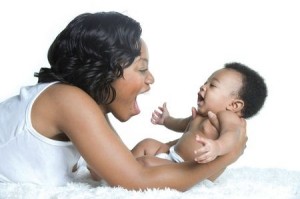 looking at the same thing from different viewpoints. This means they will be better able to play jointly with you using toys.
looking at the same thing from different viewpoints. This means they will be better able to play jointly with you using toys.
For instance they start to show you things they are playing with and look at your face to see if you like it. Or they might look at you and laugh with you when something funny happens! They learn to point at things and to understand what you’re pointing at.Babies often really enjoy this game – tirelessly pointing out doggies and airplanes and flowers!
Babies also start to understand what you’re paying attention to, and will look at things they see you looking at.
Are you thinking what I’m thinking?
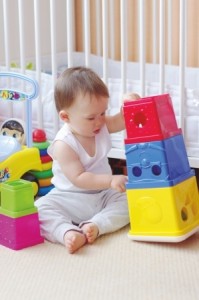 It takes children a very long time to know what’s going on in other people’s minds. Children don’t start to understand other people’s beliefs and feelings until they are 4 years of age. Children younger than age 4 think that everyone knows and believes exactly what they know and believe!
It takes children a very long time to know what’s going on in other people’s minds. Children don’t start to understand other people’s beliefs and feelings until they are 4 years of age. Children younger than age 4 think that everyone knows and believes exactly what they know and believe!
So you can’t expect your baby to be able to understand what you want or need, or to appreciate things from someone else’s point of view. It’s natural for babies to do what they want and refuse to give up toys they’re playing with because they can’t understand that other people have different wants and needs.
You can help your child to understand other people’s thoughts and feelings by trying to tune in to what’s going on in your baby’s mind. Try to put yourself in your baby’s shoes – what might she be thinking? What may he be feeling?
Talk out loud to your baby about what you think is going on in his or her mind. Talking to babies in this way will give them the best chance of understanding other people’s thoughts and feelings by the time they start school.
Someone to rely on
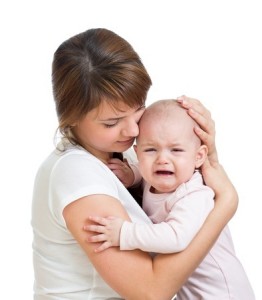 It’s important for babies to have a stable relationship with someone because this helps them to form an attachment to this person. Having someone to depend on gives babies the confidence to explore and play.
It’s important for babies to have a stable relationship with someone because this helps them to form an attachment to this person. Having someone to depend on gives babies the confidence to explore and play.
Babies start to form attachments to specific people from around 6 months onwards, and will become attached to people they see regularly—mums, dads, grannies, granddads, child-minders, and so on.
When they’re around 9 months, you’ll notice that your baby will start to become more upset if you leave him or her, or if a new person holds your baby. This shows that your baby is starting to form an attachment to you.
By 12 months, babies will have formed attachments to the people they live with and who care for them on a regular basis.
Babies vary in the way they show their attachments to people. Some babies are quite independent and interested in new people, other babies are clingy and don’t like new people. Some babies get upset if they are left by themselves for a few minutes, other babies are content to be on their own.
All of these different types of behaviour are perfectly normal, so you shouldn’t worry if your baby acts differently to other people’s babies.
Talking to your baby about their thoughts and feelings will help them to form an attachment to you, and will make them feel more confident and secure about exploring the world.
I need a hug!
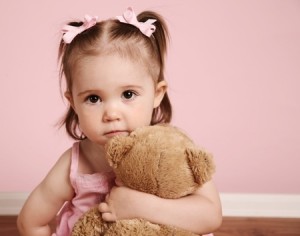 Another important thing babies need to learn is how to help themselves feel better when they need cheering up, like if they are tired, hurt or if they got a fright. Young babies can’t comfort themselves and need their parents to do this for them, through cuddling and rocking them, singing and talking gently.
Another important thing babies need to learn is how to help themselves feel better when they need cheering up, like if they are tired, hurt or if they got a fright. Young babies can’t comfort themselves and need their parents to do this for them, through cuddling and rocking them, singing and talking gently.
As they get older, babies start to learn how to help themselves too. Things like sucking a soother, rubbing a ‘blankie’ or holding a teddy are all ways babies learn to comfort themselves – isn’t that clever?!
They still need their parents’ help to feel better, but they also get more independent at soothing themselves, bit by bit, learning from their parents.
We know that babies learn to cry less if their parents promptly go and comfort them when they are crying. So it’s not ‘spoiling’ your baby if you always respond to their cries.
By the preschool years (3 and 4 years old), children might talk to themselves to feel better – so a child who falls or trips might say ‘oh oh, there there, you’re okay’ and carry on playing. This is because she has learned this encouragement from her parents, who helped her when she needed them. If her parents had criticised or scolded her every time she fell over, she wouldn’t have learned to comfort herself.
Thanks to the Getting to Know Your Baby project for letting us include this video. Copyright owned by NSPCC and Warwick Medical School: www.your-baby.org.uk
Show me the way
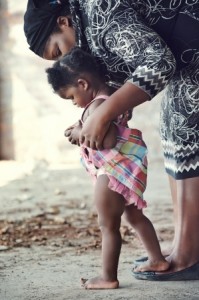 Babies learn so much about the world through their parents. Even before they can ask you questions, they use your reactions to objects and events to decide whether they are good or bad.
Babies learn so much about the world through their parents. Even before they can ask you questions, they use your reactions to objects and events to decide whether they are good or bad.
So if a mum is afraid of dogs, her baby is likely to be afraid of them too. This is because he has learned from her reactions that dogs are scary.
On the other hand, research with babies has shown that if a mum nods, smiles and makes an encouraging face to her infant, she will crawl out onto a clear plastic board that looks like she is crawling over the edge of a cliff – that’s how much babies trust their parents! It shows that babies can use their parents’ emotions to learn about the world.
Have a look at this Youtube clip to see an experiment that shows this really nicely.
It’s great to be me
 Having a good level of self-esteem means that a child feels good about themselves, that he feels valued and accepted by the most important people in his life.
Having a good level of self-esteem means that a child feels good about themselves, that he feels valued and accepted by the most important people in his life.
Children will develop better self-esteem if their parents are approving of them – so by praising them and saying nice things about what they’re doing (e.g. ‘ooh, that looks like fun’, ‘that was really nice sharing with your brother’, ‘I like your sandcastle’).
It’s really important for emotional well-being later on in life to have good self-esteem when you are young. You won’t make your child boastful or ‘cocky’ by praising them. What you will do is give them a feeling of being valued for the good things about them.
It’s also a good idea to praise the effort your child puts in to things, instead of praising who they are. So it’s better to say ‘I like how hard you’re working on that drawing’ instead of ‘That’s the best drawing I’ve ever seen’ or ‘You’re a brilliant artist’!
Focussing your praise on what your child is doing can help them to stay motivated, and to learn to deal with failure. For example if a child loses a race but tried really hard, it would be helpful for a parent to say: ‘You ran so hard, it was really close’, as this praises the effort they put in, which is more important than the result.
Find out more about positive praise here: Good Job! Is Praising Young Children a Good Idea? and How to Build Healthy Self-Esteem in Children.
Behaviour
It’s common to encounter some difficulties around your baby’s behaviour. Things like your baby waking in the night, refusing to go in the buggy, or having tantrums can be tricky behaviours to manage.
There are lots of different opinions out there on how to handle these behaviours. What we know for sure as psychologists is that babies don’t need to be told off – it doesn’t teach them anything good and can actually do them harm.
Until they are a few years old, infants are not yet able to control their actions by stopping something they want to do. So it’s pointless to tell them off for something they can’t stop – it would be like telling someone off for having hiccups!
 Your baby is never trying to be difficult on purpose. If your baby feels difficult to manage in certain situations it’s because they aren’t able to do something differently – they don’t know how.
Your baby is never trying to be difficult on purpose. If your baby feels difficult to manage in certain situations it’s because they aren’t able to do something differently – they don’t know how.
They need you to understand the difficulty they are having, and help them to overcome it. The most important thing is that you figure out WHY any tricky behaviours are happening, and then help and teach your baby to overcome those problems.
As the parent, you are in the best position to understand your child and why these behaviours might be happening. It takes patience and understanding, but it will help you to really know your child and how best to handle any tricky situations. You can ask your health visitor or GP for more support if you find you can’t figure some problems out.
 The same principle applies as your child gets older. Discipline should be about showing your child how to behave well, and understanding the reasons when they don’t. Then you can support your child to learn different behaviour.
The same principle applies as your child gets older. Discipline should be about showing your child how to behave well, and understanding the reasons when they don’t. Then you can support your child to learn different behaviour.
Tuning in to how your child is thinking and feeling can help you to do this really well. All parents struggle with this at times, so remember there are lots of resources such as parenting courses out there to help you, just ask your local children’s centre or GP.
